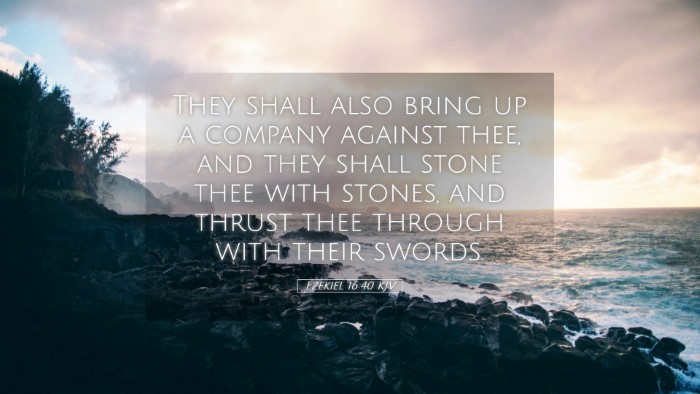Ezekiel 16:40 - A Commentary
Bible Verse: Ezekiel 16:40 - "And they shall bring up a company against thee, and they shall stone thee with stones, and thrust thee through with their swords."
Contextual Overview
The prophetic book of Ezekiel contains vivid imagery and powerful imagery reflecting God's judgment against Jerusalem. Chapter 16 elaborates on Israel’s infidelity and its metaphorical portrayal as an unfaithful wife. In this particular verse, the Lord declares judgment through an impending invasion and destruction. Understanding the historical and theological context is crucial for grasping the magnitude of this judgment.
Insights from Public Domain Commentaries
Matthew Henry's Commentary
Matthew Henry highlights the severity of divine judgment in this passage. He notes that the act of stoning represented the ultimate penalty for those found guilty of grievous sins, akin to the treatment prescribed by Mosaic law for unfaithfulness. The imagery infers not only physical violence but also a spiritual condemnation against a wayward nation.
Henry emphasizes that the phrase “they shall bring up a company” signifies the collective nature of the assailants, suggesting a divine orchestration of justice. He further underscores that this judgment reflects God’s righteousness and has its roots in how Israel has violated their covenant relationship with Him.
Albert Barnes' Commentary
Albert Barnes elucidates that Ezekiel 16:40 serves as a grim warning against the grave consequences of idolatry and moral corruption. He points out that the language is evocative of a trial where Israel is found guilty, and punishment is executed. Barnes interprets the phrase “thrust thee through with their swords” as not merely a physical act but symbolizing the complete destruction of the identity and existence of Jerusalem as God’s chosen people.
Moreover, Barnes elaborates on the metaphorical significance of the ‘company’ that comes against Jerusalem, viewing it as a symbol of surrounding nations unified in their disdain against an apostate Israel. This brings forth a poignant reminder of the price of rebellion against God.
Adam Clarke's Commentary
Adam Clarke provides a thorough exposition on the cultural and historical implications of Ezekiel 16:40. He draws attention to the legal framework within Israelite society, where stoning was a traditional mode of capital punishment for abominable acts. Clarke posits that the detailed description of the penalties signifies the seriousness of Israel’s breach of covenant.
Clarke also explores the theme of divine vengeance that runs through the narrative, arguing that the passage serves to illustrate the stark reality of divine justice. He asserts that such judgments are consequential, stemming from unfaithfulness, and that God's patience has been exhausted, signaling the time for judgment.
Theological Implications
This verse encapsulates critical theological motifs, particularly divine justice and covenant fidelity. The stark imagery of stones and swords strikes at the heart of Israel’s frequent digressions into idolatry and unfaithfulness. It reminds believers of the seriousness with which God views covenant relationships.
- Covenant Loyalty: The language of punishment serves to re-inforce the necessity of fidelity to the covenant God established with His people.
- Judgment and Accountability: The focus on communal judgment indicates the seriousness of collective sin and its implications for the whole community.
- Moral Consequence: The severity of the punishment signifies moral accountability, framing a serious warning about the nature of sin and its repercussions.
Contemporary Applications
For pastors and theologians, Ezekiel 16:40 serves as a powerful reminder of the importance of fidelity in relationships—both human and divine. It steers discussions toward the implications of turning away from God and what it means for modern congregations to live in covenantal relationship with Him.
In a broader sense, it prompts reflection upon how societal structures can exemplify collective sin and the resulting consequences. The church is called to be a beacon of faithfulness, echoing the integrity of God’s covenant amidst a culture increasingly distant from such values.
Concluding Reflections
Ezekiel 16:40 is a stark representation of divine judgment upon a wayward nation. Through the insights of Matthew Henry, Albert Barnes, and Adam Clarke, the complexities surrounding this verse reveal layers of meaning that are both historical and deeply theological. The passage serves as a caution and an invitation to deeper covenant fidelity, urging both reflection and obedience in the life of faith.


